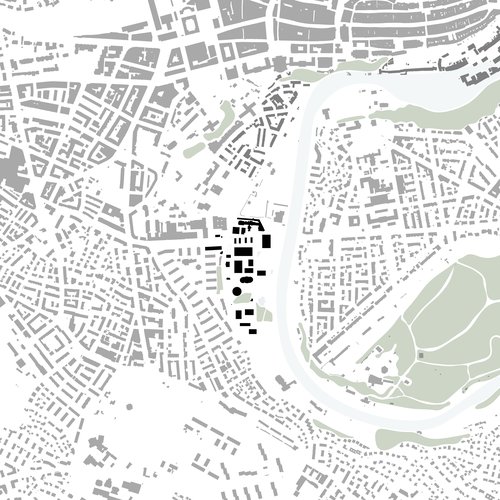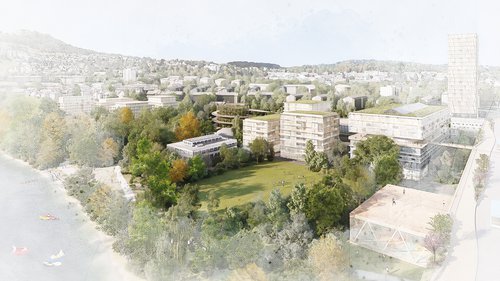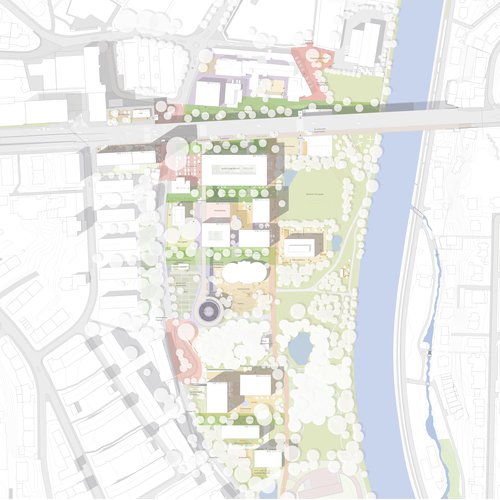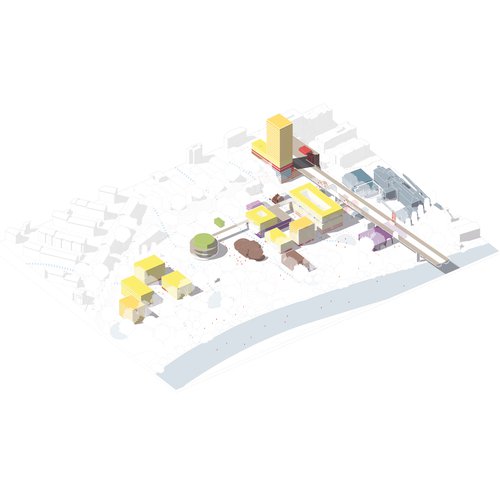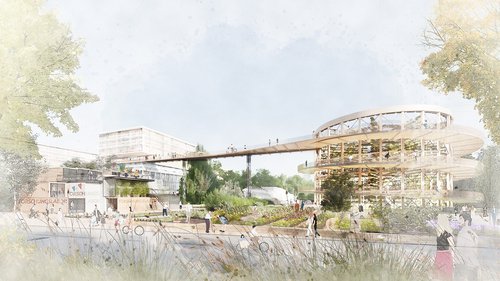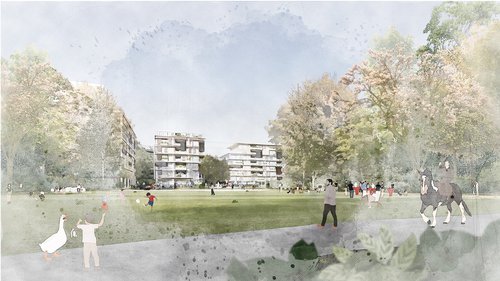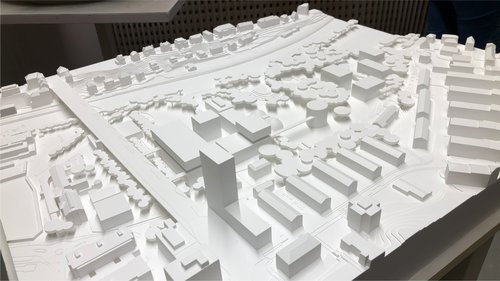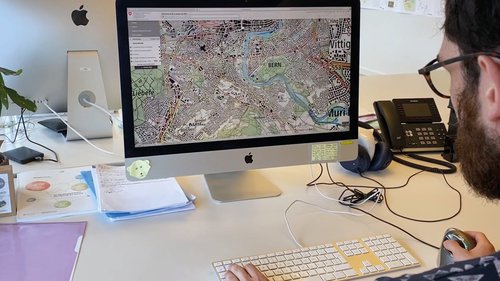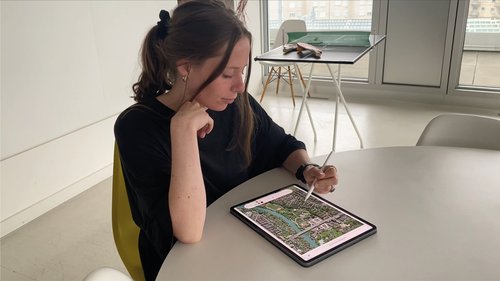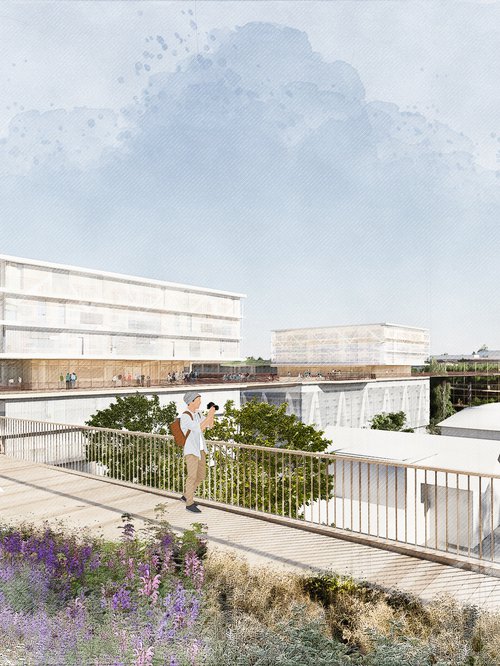
The Gaswerkareal in Bern was for a long time a production site before it became a largely inaccessible industrial wasteland. The City of Bern organised an ideas competition for the development of this central site and the adjacent Brückenkopf West area into a new urban and diverse district.
The CCHE office was awarded second place / first purchase with its "Generation ß" project out of a total of 35 participants. The urban planning idea foresees a dynamic, flexible and ecological neighbourhood, well integrated into the existing green space and very well connected to the surrounding area. It also offers innovative typologies to meet the needs of future generations.
Our "Generation ß" project takes up the structure of the existing site and thus continues to write the industrial history. In terms of urban planning, our proposal is therefore divided into three zones: a first entry zone that interacts with the Sandrainstrasse, a second zone, the primary building zone, and finally a public park to the east, facing the Aare.
The landscape architecture project foresees a dense network of alleys, squares and green spaces with a clear allocation of uses working in synergy and creating a hierarchy from public to private spaces. The "green rooms" are spaces for people, flora and fauna and form an important openess to the Aare. Almost like a pixel, the site is uses space to create a precisely designed urban place. A charming and dense place is the result.
In order to achieve the objectives of the 2000-watt society, the project is based on a passive strategy (minimisation of consumption through closed loop, wood and bioclimatic construction), supported by an active strategy to optimise the project area and to compensate for additional consumption.
This project is developed entirely with the resources and know-how available in the office. The architects, urban planners, landscape architects and parametric designers used parametric algorithms to identify the best variant for the development of this new district.
Year
2021
Procedure
Open competition
Mention
2nd rank/ 1st purchase
Developed by
CCHE Lausanne SA
Client
City of Bern
Brückenkopf Bern AG
Typology
Residential, leisure and working area
Program
Housing (mainly low-cost), crafts, gastronomy, infrastructure, sports and leisure, culture, trade, services
Zoning
Mixed
Area
80'000m2
In terms of layout, our project takes up the structure of the existing site and thus continues to write industrial history.
Bird's eye view of the new district, the Aare and the Monbijou bridge.
Site plan
Axonometry
One of the main ambitions of this urban development proposal is to connect the Gaswerk district with the upper town, which is about 16 metres higher. This connection is made by means of walkways, stairs, lifts and ramps. The walkways are connected to the Monbijou Bridge and are accessible to non-motorised traffic. They connect several buildings and spaces in the new district. A sequence of urban spaces and uses is created - at the level of the upper town. As in the old Gaswerkareal, the connections are intended to create synergies between functions and uses, both between the Gaswerkareal and the city and within the new district.
View from Sandrainstrasse to the gas boiler. Cultivation, food and much more can be tested and developed in this area.
As a reinterpretation of the gasometer, the vertical greenhouse becomes a symbol of self-sufficiency. On the one hand, it serves as a link between the lower and upper city, on the other hand, it reduces the consumption of the future district. Rainwater and grey water from the atrium are stored and treated by several natural filters (plants and fish) placed under mobile shelves. The rows of plants rotate to be supplied with light and water evenly.
Situation in the existing Gaswerkpark, looking towards the residential buildings to the south.
Coupe
Model of the "Generation ß" project
The culture of collaboration within CCHE aims to bring together the best specialists according to the needs of the project. This allowed the "Generation ß" project to be developed entirely with the resources and know-how available in the office. Architects, urban planners, landscape architects and parametric designers used parametric algorithms to identify the best variant for the development of this new district.
The collaborative process used to develop several variants in parallel to be able to retain the best elements and develop the Generation ß project, which is entirely based on the resources and know-how available within the office.
Hannes Ehrensperger, Associate Architect CCHE
Loading the orthophoto
Generation of variants
Project volumetry
Collaboration between architect and parametric designer
The collaboration with the parametric designer allowed an almost immediate visualisation of the thoughts and sketches in a digital 3D model. This allowed us to check aspects such as the integration of the buildings into the existing context, parameters such as density or, for example, the open spaces defined by the urban volume framework, and to make adjustments.
